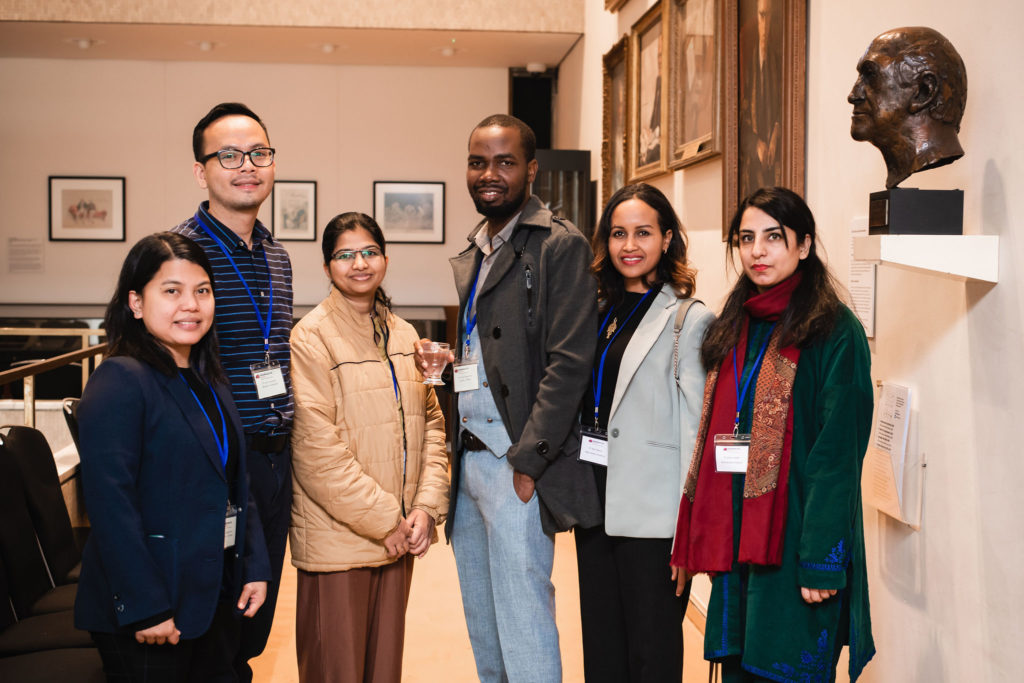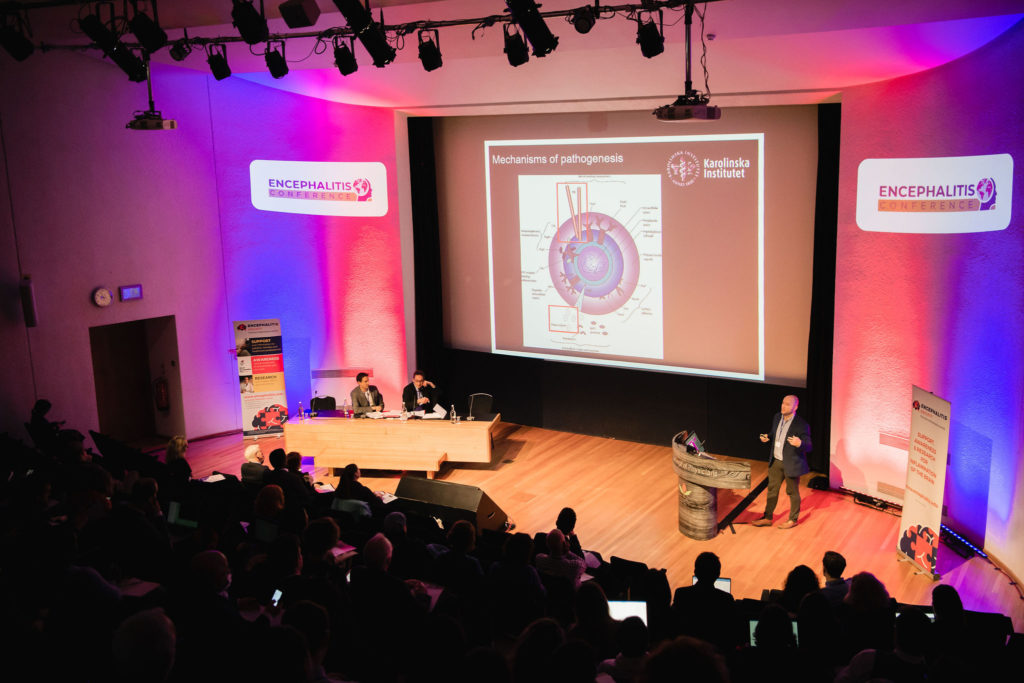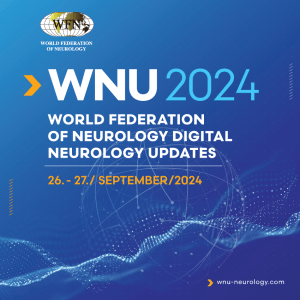As the world learns to navigate large-scale gatherings in a safe and feasible manner, the 2022 Encephalitis Conference provided an excellent example of a hybrid conference done right. Held at the Royal College of Physicians in London, 409 people attended (140 in person and 269 virtually) from 55 countries worldwide, and included a wide range of professions from neurology, psychiatry, neuroimmunology, psychology, infectious disease, intensive care and emergency medical staff to general practitioners, and other allied health professionals involved in the clinical care or research of encephalitis. This bringing together of individuals passionate about improving care and outcomes in the context of encephalitis and brain infections made for stimulating discussion about important recent and upcoming research.

Included with conference tickets was the virtual satellite meeting on Wednesday 30th November. This included a fantastic session titled ‘How to Get Your Grant or Fellowship’ hosted by Professor Benedict Michael, Assistant Professor Omar Siddiqi and Dr Mark Ellul, who gave insights into how clinical academics can best apply for funding to support research into encephalitis. They highlighted common pitfalls in writing applications, as well as tips for finding the right funding sources for different individuals. The discussion was made relevant to those from low-middle-income countries and high-income countries; and for junior and senior clinical academics alike. This was an extremely useful session, providing insights into the process and covering aspects of finding funding that are often not taught to researchers.
There was also the Data Blitz Session, in which nine elected conference posters were presented. The authors had the opportunity to discuss their work with the Encephalitis Society’s Scientific Advisory Panel, and with the audience, which prompted interesting discussion. The quality of posters was extremely high.
On the morning of Thursday 1st December, delegates were welcomed by Dr Ava Easton, CEO of the Encephalitis Society, and Dr Nicholas Davies, Chair of the Society’s Scientific Advisory Panel. The first session was chaired by Professors Arun Venkatesan and Benedict Michael, who seamlessly ensured virtual attendees were involved in questions and discussions, something which was apparent throughout the conference. The first keynote lecture was delivered virtually by Professor Russell Dale of the University of Sydney, on paediatric encephalitis. It set the scene for the day, highlighting important updates in the field, whilst consistently making the talk relevant to clinical practice and outcomes for patients. The discussion after this talk worked well, demonstrating the effectiveness of the hybrid model of conference, a testament to the hard work by Encephalitis Society team in the background.
Dr Cordelia Dunai spoke to delegates about her work in Liverpool on the neurological complications of COVID-19. She discussed the use of inflammatory biomarkers of reduced GCS as well as the application of mouse models in the context of COVID-19. This talk highlighted the importance of the international efforts in researching brain infections, and pointed to exciting work to be done in the future – finding biomarkers that might be used to identify those most at risk of neurological complications.
Professor Romain Sonneville of Université Paris Cité, France, presented results from the EURECA study, highlighting outcomes in adults with severe meningoencephalitis. The results made for sobering listening, and again provided an important backdrop for the conference. For example, it was noted that autoimmune encephalitis was a common subgroup of meningoencephalitis, and that these patients have poor outcomes overall.
The last talk of the first session was an invited guest lecture from Professor Tom Solomon CBE, giving delegates an insight into the journey of studying the impact of steroids on herpes encephalitis, as well as discussing study design and the lessons he has learned from large-scale, collaborative trial implementation. A key message was that in clinical trials, perfect can be the enemy of good; he suggested a focus on pragmatism and practicality. This talk was a useful bridging of the gap between important research fundamentals and clinical knowledge to large scale study design that can impact clinical practice. For those of us early in our careers, this provided helpful insights into the difficulties of large-scale clinical trials. Professor Solomon also discussed exciting future directions, such as the Enceph-IG study (https://www.liverpool.ac.uk/infection-veterinary-and-ecological-sciences/research/groups/brain-infections-group/enceph-ig/).
After some refreshments and viewing of the excellent posters at the exhibition stands, session two was opened and chaired by Professors Frank Leypoldt and Tom Solomon. This session was a great demonstration of the breadth of talks at the conference, starting with exciting neurobiological research and techniques, moving to neuropsychiatric factors in encephalitis and patient perspectives, and global views of encephalitis research. Professor Ana Luisa Carvalho started the session by presenting work on Human anti-CASPR2 autoantibodies and their impact on neuronal architecture. Given the discussion earlier in the day regarding the poor outcomes in autoimmune encephalitis, this presentation regarding how certain antibodies might mediate neurological sequelae, such as via reduction in cohesive neuronal firing, was extremely pertinent.

Associate Professor Federico Iovino then presented work on the use of bacterial-neuron interaction blockades in attempting to minimise neurological sequelae after brain infection. This was really exciting work, showcasing methodologies that reduce bacterial adhesion and access to neuronal cells, and thereby might minimise the effects pneumococcal infections can have on the brain. Importantly, although there is more work to be done in this area, the indication that this can have effects on clinical outcomes and neurological sequelae gives hope that these techniques might provide another avenue for clinicians moving forward.
Dr Antonio Farina then discussed immune checkpoint inhibitor related encephalitis, and importantly highlighted stratification of these patients and their outcomes. As a less frequently discussed encephalitis presentation, this was interesting and extremely useful for clinicians and academics alike.
Taking the session from fascinating neurobiological and immunological research to more clinical aspects, Dr Sonali Polakhare presented some work on the neuropsychiatric factors affecting outcomes in encephalitis, which prompted interesting discussion regarding the interpretation of symptomology as side-effect versus part of the core disease process, such as in the context of extrapyramidal side-effects vs movement disorder. For those in the earlier stages of their careers this was an important insight into the nuanced delineation of clinical syndromes in the context of brain infections, and the importance of multidisciplinary discussion to maximise positive outcomes for patients.
Dr Julia Granerod then delivered the second invited guest lecture, speaking about how all the important basic science and clinical work discussed so far translates into epidemiology and public policy to impact global clinical practice. She discussed the importance of availability of resources in the implementation of policy recommendations, and the impact this can in turn have on global research. Highlighting variation in terms of access, treatment and outcomes between countries demonstrated that even as incredible research brings this field forward, there is still work to be done, both in lab settings and political and economic contexts, to ensure patients benefit globally.
After a delicious lunch and some more time to view the posters, Assistant Professor Stacey Clardy and Dr Nicholas Davies opened session three. Ms Marie Vermeiren presented data on long-term clinical outcomes in anti-CASPR2 encephalitis patients, including the tendency for patients to re-present with similar symptoms to their initial presentation, even though across a cohort individuals will have varying symptomologies, essentially demonstrating that new symptoms rarely appear in relapses of encephalitis.
Ms Vasundharaa S Nair then delivered a virtual presentation from NIMHANS in Bengaluru, India, speaking about her work looking qualitatively at the lived experiences of individuals with acute brain infections. This provided an interesting collation of qualitative aspects of encephalitis, highlighting both patients’ and carers’ perspectives. This aspect is often missed at academic conferences, and provided an important recentering of the purpose of the research being conducted in this field.
Professor Frank Leypoldt presented further research on CASPR2 antibody mediated encephalitis, highlighting the important presentation of orthostatic polymyoclonus. This stimulated interesting discussion regarding the diagnosis and treatment of a rare presentation within a rare, albeit important, disease. Much of this discussion revolved around the use of electrophysiology amongst other approaches, but again this highlighted the important resource discrepancy between regions and the impact this must have on guidelines.
Building again on antibody mediated encephalitis, Professor Carsten Finke delivered a virtual talk on structural and functional neuroimaging in patients with NMDAR encephalitis. Highlighting that NMDA can be considered a molecular mechanism for learning and memory, antibody mediated encephalitis has clear cognitive consequences. He discussed the use of virtual environment navigation assessments to explore patients’ executive function and spatial navigation, linking these cognitive outcome measures to neuroimaging measures. It was highlighted that global and hippocampal volume loss after NMDAR encephalitis seems to be reversible, but change in hippocampal connectivity might not recover. This led to interesting discussion regarding whether alterations to functional brain networks might underpin cognitive changes in the medium term – as captured by the spatial navigation tasks. This raised the possibility of using neuroimaging biomarkers in identifying patients at greater risk of cognitive deficits in this patient cohort.
During the final break it was time for the final poster viewing session with some refilling of coffee and tea. The final session of the day was hosted by Dr Ava Easton and Professor Sarosh Irani, and it opened with the hybrid data blitz session of Encephalitis Society funded research: Dr Jamil Kahwagi and Dr Oliver Harschnitz presented their work. After this was the hotly anticipated debate, chaired by Professor Sarosh Irani and Dr Ava Easton. Dr Thomas Pollak presented the house’s argument: ‘Too many patients with psychiatric illness are being unhelpfully diagnosed with brain autoimmunity’. Dr Pollak pointed out the medical field’s propensity for ‘MonoCausoTaxoPhilia’, an unending excitement for an explanatory story that deals with all patients. He argued that this is almost always unhelpful, and in this context is leading to an epidemic of patients being told their psychiatric diagnosis can be fully explained by brain inflammation. Stepping in to argue against the house, Associate Professor Janet Cunningham laid out excellent arguments highlighting the increasing evidence for autoimmune processes underpinning some patients psychiatric symptoms. Amongst her points, she made brilliant use of Dr Pollak’s own published work against him. It was an excellent and stimulating debate. Both parties presented their cases well and responded brilliantly to some tough questions. You could argue that in the end, they were presenting the same argument – that autoimmunity will be explanatory for some but not all patients, and so more research in this area is required to elucidate how we can recognise this aetiology more accurately and promptly.
After the debate, Assistant Professor Stacey Clardy from the University of Utah delivered the final keynote lecture, speaking to the landscape of clinical trials in autoimmune encephalitis. A wonderful talk to follow from the debate, and to finish the conference on, she took the delegates through the large clinical trials in this field, and how the community can move forward. Picking up on Professor Tom Solomon’s earlier reference to the aphorism, ‘perfect is the enemy of good’, Professor Clardy noted that through this proverb we risk complacency in autoimmune encephalitis research. One way she highlighted this was by noting that although mortality in encephalitis contexts has improved, morbidity and lasting disability remains high, as noted by talks throughout the day. A focus on patient experience shows that clinical outcomes still leave much to be desired. This led to discussion regarding avoiding using anecdotal data to support the notion that current practice is ‘good enough’, to the detriment of improving patient outcomes. Professor Clardy summed this up in the statement, ‘as a field we have a tonne of opportunity, but therefore a tonne of responsibility’. This felt like a poignant message to bring the conference towards its close, and an important point for the juniors in this field to keep in mind.
As the day came to an end, the prizes for best oral and poster presentations were given. The quality was extremely high across the board, but special note was given to the winners Dr Sukhvir Wright and Dr Matt Butler for their poster presentations (Peripherally-derived monoclonal LGI1 antibodies cause epileptic seizures in a passive transfer animal model and Patients’ perspectives on mental health in encephalitis: An international web-based questionnaire study) and Dr Marie Vermeiren for her oral presentation (Long-term clinical outcome and relapse rate in a Dutch anti-CASPR2 encephalitis cohort). Phillippa Chapman, deputy CEO of the Encephalitis Society, showed a video showcasing the work of the Society over the course of 2022, a thanks to all who had contributed, and a call to action moving into 2023 to not only support the work of the Society but also the 10-year anniversary of World Encephalitis Day on 22nd February.
The conference was closed by Dr Ava Easton and Dr Nicholas Davies, followed by a wine reception in the Royal College of Physicians. It was an excellent day, with a wide range of research and topics covered, bringing scientific and clinical work into the context of patient perspectives and outcomes, along with viewing them through the lens of global policy. The conference also acted as a model for hybrid meetings, with a great focus on involving virtual delegates, and the opportunity to rewatch talks for 45 days after the conference. On behalf of all delegates, a huge thanks to the Encephalitis Society team, and everyone who made the day possible.
The next Encephalitis Conference will be held on the 4th and 5th December 2023 at the Royal College Physicians, London, UK and virtually. Sign up for free professional membership to the Encephalitis Society to be alerted to the programme, and other opportunities such as seed funding, grants, and bursaries.
Find out more at about professional membership to the Encephalitis Society here.

